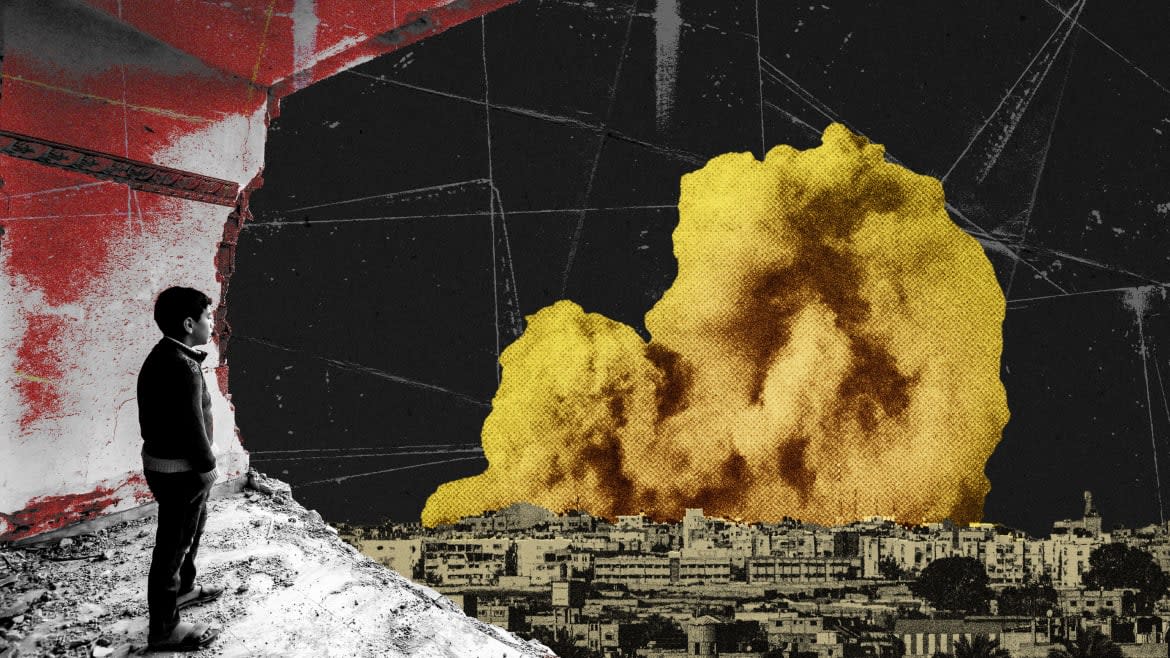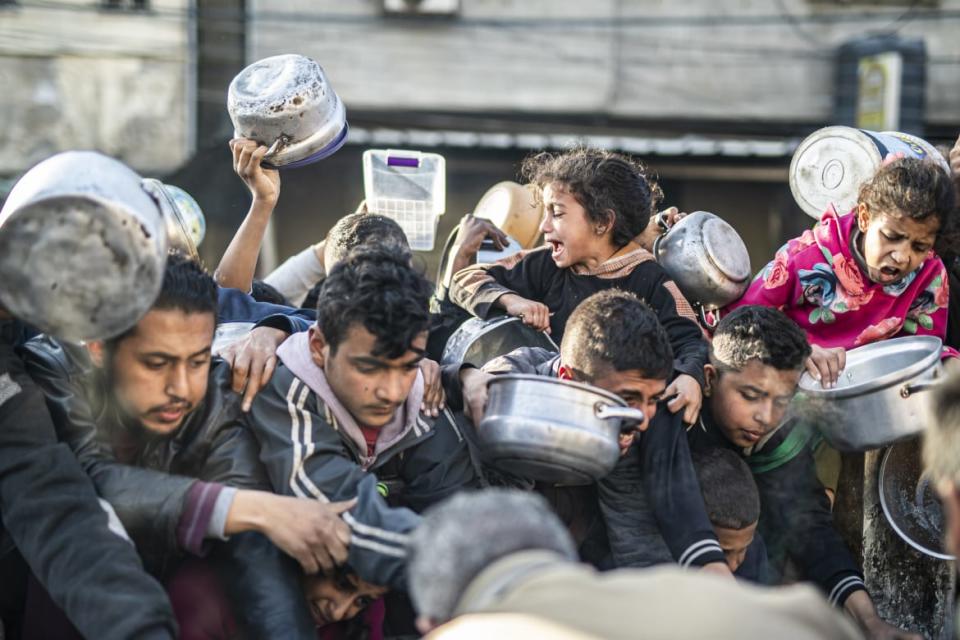Israel’s Cryptic Evacuation Plan for 1.4 Million Palestinians

- Oops!Something went wrong.Please try again later.
The Israeli military has revealed a new plan to evacuate a significant number of the 1.4 million Palestinian civilians in Rafah ahead of the looming ground offensive approved by Israeli Prime Minister Benjamin Netanyahu this week.
In a statement on Wednesday, Israeli Defense Forces (IDF) spokesperson Daniel Hagari said that the military will move vulnerable civilians to “humanitarian islands” elsewhere in Gaza, where they will supposedly be provided with temporary housing, food, and water. Hagari claimed Israel will create the humanitarian zones “with the international community.”
The vague briefing, however, has raised questions about how the IDF will facilitate the evacuation on the ground—and whether the operation will be conducted in a way that actually safeguards civilians in compliance with international law.
One major concern about the alleged plan for Rafah evacuations is that Israel hasn’t detailed who or what force will provide security for the Palestinians as they transit from Rafah to the purported humanitarian islands, according to John Spencer, the chair of urban warfare studies at the Modern War Institute and a combat veteran.
For “the evacuation of civilians to any area outside of where they currently are… who’s going to provide the security framework? Is it going to be safe to conduct the operation?” As with any plan, “the devil is in the details,” Spencer added. And so far, the Israeli government hasn’t looped the Biden administration.

Palestinians in Rafah line up to receive food distributed by aid organizations.
Secretary of State Tony Blinken noted this week that Israel must have a “clear and implementable plan” for safeguarding civilians from an Israeli attack on Rafah.“We’ve not yet seen such a plan,” Blinken told reporters. The White House National Security Council confirmed on Friday that Israel had not shared its plans with the Biden administration.
The concerns coincide with a growing backlash against Israel over the humanitarian crisis in Gaza, which has been deteriorating ever since the war began on Oct. 7. Aid distribution in Gaza has been restricted, and human rights organizations have been warning that the amount of aid flowing in is not enough. At least 16 children have now died of malnutrition and dehydration in the north, according to The Washington Post, adding to an already catastrophic civilian death toll.
The United Nations previously warned that conducting a ground offensive in Rafah would “lead to slaughter.” More than 600,000 children are in Rafah, according to the UN—and an attack there could lead to further disruption in a struggling humanitarian aid ecosystem.
Toeing the Line
At this point, the ostensible evacuation plan appears to be “consistent with the law,” according to Michael Schmitt, the G. Norman Lieber Distinguished Scholar at West Point’s Lieber Institute who served 20 years in the United States Air Force as a judge advocate. “So long as it is—and this is a caveat—so long as it’s executed in a way that takes into consideration the wellbeing of the civilian population… so long as they do it in a manner that is in good faith,” Schmitt told The Daily Beast.
There is a legal obligation to warn a civilian population about attacks if they are going to affect civilians, and it looks like Israel plans to stay in line with this obligation, Schmitt added.
“When you are going to conduct the attacks, which the IDF certainly is, there is a legal obligation to warn the civilian population that those attacks are going to occur, so long has the attacks will affect the population, which these very obviously will,” Schmitt said, referring to the Fourth Geneva Convention.
Israel’s ‘Day After’ Plan for Gaza Is Full of Holes
The question of whether Israel will be obligated to provide aid to evacuees under international law will depend on where exactly the “humanitarian islands” are located, according to Schmitt. “If they move into territory that the Israelis are in effective control of—that being the legal standard—then Israel now is obligated to care for them,” he said.
But if the Israelis are “not in effective control of territory,” Schmitt added, “the Israeli obligation is to allow aid to be given to the civilian population, and [it] cannot impede arbitrarily the transfer of aid into those areas.”
Sean Watts, a professor in the Department of Law at the United States Military Academy at West Point, affirmed that the alleged plan seems to harken back to the Geneva Conventions.
“This plan is reminiscent of provisions of the 1949 Geneva Conventions that envision establishing safety zones for civilians and persons endangered by combat,” Watts said.
U.S. officials have made clear to Israel that the Biden administration expects Israel to provide food, water, and other resources to the Palestinians if they leave Rafah.
“Given the large number of civilians that are now in Rafah, many of them displaced from other parts of Gaza… we need to see a plan that will get civilians out of harm’s way if there’s to be a military operation in Rafah—and not only gets them out of harm’s way but also ensures that they have what they need—that they have shelter, that they have food, that they have medicine,” Blinken told reporters this week.
Get the Daily Beast's biggest scoops and scandals delivered right to your inbox. Sign up now.
Stay informed and gain unlimited access to the Daily Beast's unmatched reporting. Subscribe now.

